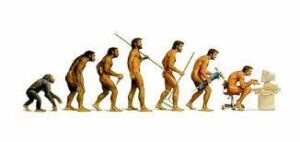Controversial evolution topics stir up quite the storm in scientific circles, don’t they? It’s like diving into a whirlpool of debates and discussions that challenge our understanding of how life evolves.
From the contentious origins of life itself to the heated debates about speciation mechanisms, these topics push us to question, analyze, and sometimes even argue passionately. So, buckle up as we embark on a journey through the tangled web of evolutionary discourse, exploring the twists and turns of these controversial evolution topics.
What is controversial evolution topics?

Evolution, being a cornerstone of biology, often sparks debates and controversies, particularly in areas where scientific findings intersect with religious or ideological beliefs. Some controversial topics related to evolution include:
- Teaching Evolution in Schools: The debate over whether evolution should be taught in schools, particularly in the context of religiously conservative communities that advocate for the teaching of creationism or intelligent design alongside or instead of evolution.
- Intelligent Design: This is the concept that certain features of the universe and living organisms are best explained by an intelligent cause, rather than by natural selection. Proponents argue that some features of the natural world are too complex to have evolved through purely natural processes.
- Creationism: The belief that the universe and living organisms originate from specific acts of divine creation, as described in religious texts. Young Earth Creationism, in particular, holds that the Earth and all life on it were created by God within a literal interpretation of the Biblical account in Genesis.
- Evolutionary Psychology: This field applies evolutionary theory to human behavior and cognition. Controversies arise over the extent to which behaviors or psychological traits can be attributed to evolutionary pressures versus cultural or environmental factors.
- Human Evolution: Debates and controversies exist around specific aspects of human evolution, such as the timing and mechanisms of key evolutionary transitions, the relationship between Homo sapiens and other hominin species, and the genetic basis of human variation.
- Evolution and Morality: Some debates center on whether evolutionary principles can or should inform our understanding of morality and ethical behavior. Critics argue against attempts to derive moral norms from evolutionary theory, raising concerns about biological determinism and the “naturalistic fallacy.”
- Social Darwinism: This is the application of Darwinian principles to society, particularly in the context of justifying economic inequality or social policies. Critics argue that Social Darwinism misinterprets evolution and promotes harmful ideologies.
- Evolution and Religion: The relationship between evolution and religious beliefs continues to be a contentious issue for many people. Some religious groups fully accept evolutionary theory, while others reject it outright or seek to reconcile it with their faith through various interpretations, such as theistic evolution.
These topics often touch on deeply held beliefs and values, leading to passionate debates among scientists, religious leaders, policymakers, and the general public.
Should controversial evolution topics be discussed?
Yes, discussing controversial topics related to evolution is crucial for several reasons:
- Scientific Literacy: Understanding evolution is fundamental to comprehending modern biology. By discussing controversial topics, educators can ensure that students are exposed to the breadth of scientific knowledge and critical thinking skills necessary to evaluate evidence and make informed decisions.
- Promoting Critical Thinking: Exploring controversial topics encourages critical thinking and scientific inquiry. It teaches individuals to examine evidence, evaluate arguments, and distinguish between scientific consensus and pseudoscience or unsupported claims.
- Addressing Misconceptions: Open dialogue about controversial topics provides opportunities to address misconceptions and clarify scientific concepts. By engaging in constructive conversations, individuals can better understand the evidence supporting evolution and dispel common myths or misunderstandings.
- Fostering Respectful Discourse: Controversial topics can elicit strong emotions and deeply held beliefs. However, respectful and evidence-based discourse is essential for bridging divides and promoting understanding between individuals with differing perspectives. By encouraging open dialogue, communities can foster mutual respect and tolerance.
- Navigating Societal Implications: Many controversial evolution topics intersect with broader societal issues, such as education policy, religious freedom, and public health. Discussing these topics allows society to navigate these complex issues in a thoughtful and informed manner, considering both scientific evidence and ethical considerations.
- Advancing Scientific Understanding: Controversial topics can stimulate scientific research and inquiry. Addressing dissenting viewpoints and exploring alternative hypotheses fosters innovation and advances our understanding of evolutionary processes.
While discussing controversial evolution topics may provoke disagreement or discomfort, engaging in these conversations is essential for promoting scientific literacy, critical thinking, and respectful dialogue within society.
50 Controversial evolution topics

Here are 50 controversial evolution topics categorized for clarity, along with brief explanations:
Teaching and Education:
- Teaching Evolution in Schools: Debate over whether evolution should be taught in schools, particularly in regions with religious opposition.
- Intelligent Design in Education: Controversy surrounding the inclusion of intelligent design in science curricula alongside evolution.
- Science Standards: Disputes regarding the inclusion of evolution in state science education standards.
Scientific Theory:
- Theory of Evolution: Debates over the status of evolution as a scientific theory versus a mere hypothesis.
- Alternative Evolutionary Theories: Controversies surrounding alternative theories such as punctuated equilibrium and group selection.
Human Evolution:
- Human Ancestry: Disputes over the lineage of modern humans and relationships with other hominin species.
- Origin of Language: Controversy regarding the evolutionary origins of human language and its development.
- Behavioral Evolution: Debates about the role of evolution in shaping human behavior and cognition.
Genetics and Evolution:
- Genetic Drift vs. Natural Selection: Controversy over the relative importance of genetic drift and natural selection in driving evolutionary change.
- Epigenetics and Evolution: Discussions on how epigenetic mechanisms influence evolution and adaptation.
Evolutionary Mechanisms:
- Mutation: Debate over the role of mutation in generating genetic variation and driving evolution.
- Sexual Selection: Controversies surrounding the mechanisms and consequences of sexual selection in evolution.
Evolution and Religion:
- Creationism vs. Evolution: Conflict between religious creationist beliefs and evolutionary theory.
- Theistic Evolution: Debate over the compatibility of evolutionary theory with religious beliefs, such as theistic evolution.
Evolution and Morality:
- Evolutionary Ethics: Discussions on whether moral principles can be derived from evolutionary theory.
- Altruism and Cooperation: Controversy regarding the evolutionary origins of altruistic behavior and cooperation.
Social Implications:
- Social Darwinism: Debate over the misuse of evolutionary principles to justify social and economic inequalities.
- Evolution and Gender: Controversies surrounding the application of evolutionary theory to gender differences and roles in society.
Evolutionary Psychology:
- Evolution of Religion: Discussions on the evolutionary origins and functions of religious beliefs and practices.
- Evolution of Art and Culture: Controversy regarding the evolutionary explanations for artistic expression and cultural phenomena.
Evolutionary Applications:
- Evolutionary Medicine: Debates over the application of evolutionary principles to understanding human health and disease.
- Evolutionary Algorithms: Controversies surrounding the use of evolutionary algorithms in technology and optimization.
Evolutionary Processes:
- Speciation: Debate over the mechanisms of speciation and the definition of species.
- Extinction: Controversies surrounding the causes and consequences of mass extinctions throughout evolutionary history.
Evolutionary Developmental Biology (Evo-Devo):
- Evo-Devo and Evolution: Discussions on how developmental processes influence evolutionary change.
- Regulatory Evolution: Controversy over the role of gene regulation in driving evolutionary innovation.
Paleontology and Evolution:
- Transitional Fossils: Debate over the significance of transitional fossils in documenting evolutionary transitions.
- Evolutionary Trends: Controversies surrounding the existence and interpretation of evolutionary trends in the fossil record.
Evolutionary Ecology:
- Evolutionary Arms Race: Discussions on coevolutionary dynamics between species engaged in antagonistic relationships.
- Evolutionary Applications in Conservation: Controversies surrounding the use of evolutionary principles in conservation biology.
Evolutionary Genetics:
- Gene Flow vs. Genetic Isolation: Debate over the relative importance of gene flow and genetic isolation in speciation.
- Adaptive Evolution: Controversy regarding the mechanisms and pace of adaptive evolution in response to changing environments.
Evolutionary Diversity:
- Evolution of Biodiversity: Discussions on the processes driving the diversification of life on Earth.
- Evolution of Complex Traits: Controversies surrounding the evolution of complex traits such as intelligence and consciousness.
Evolutionary Adaptations:
- Evolution of Mimicry: Debate over the evolutionary origins and adaptive significance of mimicry in animals.
- Evolution of Venom: Controversies surrounding the evolution of venomous adaptations in various animal groups.
Evolutionary Conservation:
- Evolutionary Rescue: Discussions on the potential for evolutionary processes to aid in the conservation of threatened species.
- Evolutionary Consequences of Climate Change: Controversies surrounding the evolutionary responses of organisms to rapid environmental changes.
Evolutionary Anthropology:
- Cultural Evolution: Debate over the role of cultural evolution versus genetic evolution in shaping human societies.
- Evolutionary Perspectives on War and Conflict: Controversies surrounding evolutionary explanations for human warfare and aggression.
Evolutionary Theory Development:
- Extended Evolutionary Synthesis: Discussions on proposed expansions or revisions to the modern synthesis of evolutionary theory.
- Evolutionary Theory and Complexity: Controversies surrounding the application of evolutionary principles to complex systems theory.
Evolutionary History:
- Evolutionary Timelines: Debate over the timing and sequence of key evolutionary events in Earth’s history.
- Evolution of Multicellularity: Controversies surrounding the origins and evolutionary significance of multicellular organisms.
Evolution and Technology:
- Synthetic Biology and Evolution: Discussions on the implications of synthetic biology for evolutionary processes.
- Evolutionary Robotics: Controversies surrounding the use of evolutionary algorithms to design robots and artificial intelligence systems.
Evolutionary Neuroscience:
- Evolution of the Brain: Debate over the evolutionary origins and development of the human brain.
- Evolutionary Perspectives on Consciousness: Controversies surrounding evolutionary explanations for consciousness and subjective experience.
Ethical and Policy Issues:
- Ethical Implications of Evolution: Discussions on the ethical implications of evolutionary theory for areas such as biotechnology and human enhancement.
- Policy Debates on Evolutionary Education: Controversies surrounding government policies on the teaching of evolution in schools and public institutions.
These topics encompass a wide range of issues related to evolution, reflecting the diversity of perspectives and debates within the field.
Conclusion
Controversial evolution topics encompass a vast array of issues, spanning scientific theory, education, religion, ethics, and societal implications. These discussions provoke debate, challenge entrenched beliefs, and stimulate critical thinking. By engaging with controversial evolution topics, we foster scientific literacy, promote respectful dialogue, and address societal challenges.
Embracing the complexity of these discussions is essential for advancing our understanding of evolution and its implications for science, education, and society. Controversial evolution topics spark discourse that is both intellectually stimulating and socially significant, driving progress and shaping our collective understanding of the natural world

